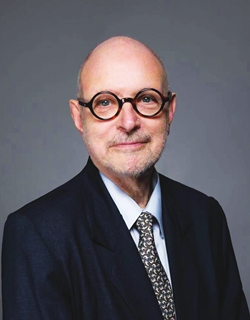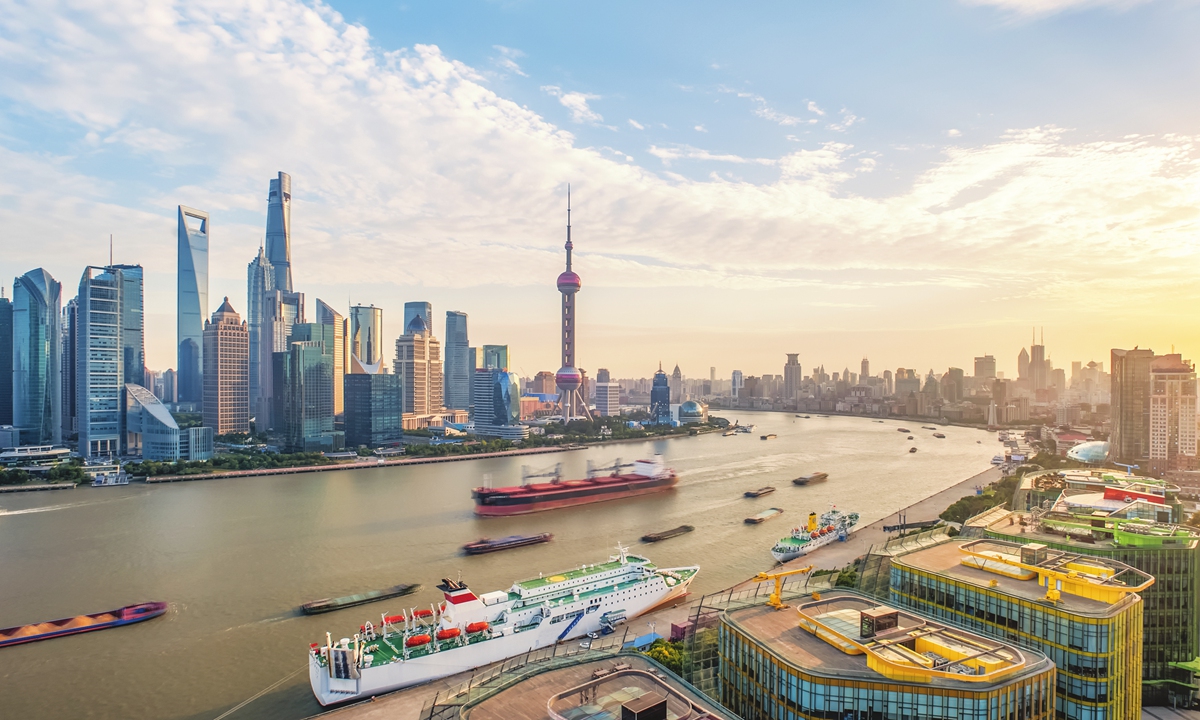Editor’s Note:
For the Chinese people, the past decade has been epic and inspirational. The country, under the leadership of the CPC Central Committee with Comrade Xi Jinping at the core, has made great endeavors in boosting its economy, deepening reforms, improving the rights of its people and acting as a responsible power globally.
There have been many misunderstandings and vilification toward China outside the country which has experienced decades of extraordinary development. Global Times (GT) reporter Yan Yuzhu talked to Professor David Goodman (Goodman), Director of the China Studies Centre at the University of Sydney, who has spent many years doing research in different parts of China, about his experience in China and his research on common prosperity, his opinions on the CPC leadership, as well as how he thinks of Western politicization of China-related issues.
This is the 17th article of the series about this special decade.
GT: You have lived in several cities in China over the past decades. What has impressed you the most about the changes in China, especially over the past 10 years?
Goodman: China has changed dramatically. When I first lived in China, I think at the very first year I didn’t eat very well. We ate better than most Chinese for sure because we were privileged as foreigners. We had rice but I never had very much meat. So at Christmas time, I went to Hong Kong straight over the border, off the train into McDonald’s. Of course, after that, McDonald’s came to China, and indeed everything changed in the 1980s. Just look at the standard of living, particularly on the eastern coast where rose the big cities such as Beijing, Shanghai, and Tianjin. Those areas have changed dramatically out of sight. When I first went to Tianjin and Suzhou in the 1970s, these were indeed very poor areas.
And now like all the cities in China, 40 years of dramatic change mean just what it says. You have better healthcare, better street care, and better communications. If you live somewhere like Suzhou, you’ll find the new areas of the city have a higher standard of living than much of Western Europe. If you travel as I had done from the Suzhou Industrial Park to London, you’ll think you’re going to the third world. The eastern part of Jiangsu between Suzhou and Shanghai is so well developed. Even in western China such as Qinghai and Lanzhou, or in Northwest Sichuan, it’s better than it used to be, as there is now public transport and roads, whereas in the 70s, it was very difficult to travel around.
GT: You have mentioned that you were born into a left-wing family in Britain, and you have relatives who were communists. How do you understand the theories and ideals of communism? How do you see the role of the CPC in the country’s development?
Goodman: Firstly, theories of communism that I grew up in were very much a product of the first half of the 20th century, very much a product of the war against fascism, and very much the impact of industrialization on Western Europe. In that process of industrialization, you had capitalism running rampant and the workers needing to organize.
That isn’t the situation now. What drew people to communism in the first half of the 20th century was almost certainly a belief in equality of people, and the need for greater equality and reaching a more equal society. In the pre-industrial societies and in the industrial stage of social development, the privileged are the only ones getting the benefits of change. I think people were attracted to communism, because they thought that opportunities should be made available more freely. In those days, global integration was much less than it is now. We have communications that go around the world, and we have economic integration which dramatically changes how societies are.
When I was a child, if my mother wanted to buy an ironing board, she would have to save almost a month’s wages to buy that kind of equipment. Why? Because iron and coal were expensive at that time, and there were only small communities as countries back then were very small as well. If you go onto a world’s stage, you can have different value of labor in different places, different ways of production. And that is how China has become one of the great economies of the world by using its comparative advantage of cheap labor at first, and plentiful supplies as well as large market to then grow its size in economy and its power as a result.
So I think communism now has to be something very different, which the state directs whilst accepting that there is an important role to be played by market forces within that framework. I think largely that’s what the Communist Party of China is actually doing. It’s not easy to get from where we are now to what is seen as being the future perfect society.
A lot of people outside China have talked about the possibility of “China being a liberal democracy,” as opposed to the communist democracy. But can you imagine what would happen if there were a liberal democracy tomorrow in China? Some good things might happen, but some really bad things might happen too. First, you need a culture of liberal democracy since you can’t just impose it on a country. But in many cases liberal democracy was imposed without a relevant culture and people hoped that things might change for the better. However, it doesn’t always work that way, and the two obvious examples of that are India and Japan. Let’s not pretend that liberal democracy is the only answer to everything.

David Goodman. Photo: courtesy of Goodman
GT: In an interview, you said that you looked forward to going back to China to do a research project on common prosperity with your Chinese friends. Which regions/areas would you choose to study China’s common prosperity?
Goodman: Outside china, common prosperity is being greeted as though it were going back to a Maoist idea of egalitarian which means everybody should be made equal. I don’t see it that way. China has a very interesting pilot project in Zhejiang which was reported in the middle of 2021. The starting point seems to be two things: first, there is a need for greater welfare at the local level; second, there’s also a need for a reform of public finance, because huge amount of government revenue goes to local government. Unless you’re taxing people properly, you’re not going to be able to run the government, even if you have all these state-owned enterprises. So how I read the common prosperity is that it’s an intent at the local level to bring businesses, local governments, social organizations, and welfare services together, both to fund what needs to be done and provide the service for things like health, education, social services, aged care, and so on.
Very few countries have deliberately sat down and tried to carve out a plan for creating a welfare state in this way. Early in the 1940s, Britain had a plan called the Beveridge Report, which, though, had to be amended as it went along and has been largely abandoned because people got rich, things changed and it wasn’t totally successful. However, most countries don’t even do it. The US has never gone anywhere close to it, just saying, if you want welfare, you have to work. But there is a need for individuals to be looked after by collective endeavour if they can’t look after themselves, and there are many different ways of doing so.
What interests me in China about common prosperity is that this might be a way of doing it in a particular system. Very few systems are like China’s. First of all, China is enormous. It’s not like Germany, Britain or Japan, but like a series of those countries. So the scale of the welfare is also enormous, and scale also means huge differences within.
As for where we’re going to do our project, we’ve chosen three areas around China to see how it might be possible to see common prosperity emerge: Suzhou, Taiyuan, and Lanzhou. They’re not representative of the whole of China, but Suzhou no doubt represents wealthy China, while Taiyuan represents the industrial North, and Lanzhou represents very much the West. They are representative at least some of the patterns of China’s development.
“Local” in China is a difficult concept, which is neither like the center nor the provinces. Instead, we are looking at the county level and the prefecture level, investigating the policies and their implementation of common prosperity in those three places in the prefecture level, but also underneath in the urban and rural districts and the county-level cities. In our research, we are going to talk to entrepreneurs and local government officials, including welfare officials, to see how they work.
GT: The CPC has stepped into its second century. What are your expectations for the future of China under the leadership of the CPC?
Goodman: Many predictions about China by other countries have been wrong, and people outside China should learn to expect the unexpected in the country. It’s almost as if in terms of economic development, one has to write the rule book of economic development again considering the situation in China.
I was working in the Australian Department of Foreign Affairs in the 1990s, doing a report on development in China. Somebody said to me that China was lying about its economic growth statistics. And I said what we should bear in mind is that how is so much growth generated in a country? What’s happened in China is not that the whole country has grown at those rates at the same time, but it started in Guangdong, at the growth of rates of 27-30 percent for a number of years.
Then it slowed down, and the high point of growth went around the coast to Fujian and Shanghai. After that, the high growth went up north and came down south again. It brings us back to the question of scale. China is not a single economy, and one has to understand the dynamics of these changes. It’s crazy to think that China doesn’t have varied difference within just because it is a single political system.
On the level of strategy, it’s very important to understand the nature of China. Indeed, a kind of Chinese nationalism and unity is an important part of what the CPC delivers, but the unity is not because it’s all the same in China, instead, you can have unity through difference. That will be a more sophisticated way of looking at a country.
So, the way the party organizes itself is crucial to maintaining its leadership of the country in a good way. Without organizing itself properly, the problem will also be huge for the rest of the world since we have a high degree of globalization and economic integration.
GT: How do you feel about Western media and some politicians having long been obsessed with putting a label on China and poisoning the well of China?
Goodman: It’s obvious that there isn’t enough China literacy outside China. People often make statements about China without knowing it well. They just make statements because they’re paid to do so. China literacy can be very low abroad, and over-generating about China is only a start. Then it goes to the discussion that whether China has the right to grow its economy and be a growing superpower. If it does, then that makes a difference to the way that other countries of the world have to see it.
Lawmakers in the US have been saying that China’s rise as an economic power is an existential threat to the US, because there will be a second superpower. It encourages war and conflict based on the way that Americans think about themselves: the US is the only country that matters and it has to be in charge.
I think the US is indeed a very strange country. I’ve been in the US a lot and know it quite well. But I suppose I know China better in lots of different ways, that’s why I think some people in the US can be so ignorant. Indeed, there are different problems in China, just as there are in the US, where a Black or a Hispanic in a poor part will definitely suffer a lot. It’s very uncomfortable for me when American protestants and white men start talking about human rights and the way the world should be. Countries need to be very careful when they make statements.
I think people of any countries as a whole have a right to speak up about injustice wherever it is. But when someone starts to politicize it and then it becomes a matter of political relations between two countries or a way of starting a war, things will be very awful because it’s not a way of trying to solve the problems.











